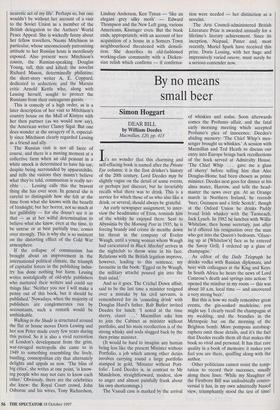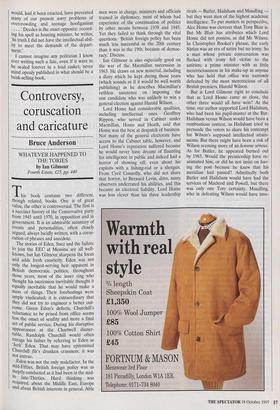By no means small beer
Simon Hoggart
DEAR BILL by William Deedes Macmillan, £20, pp. 413 It's no wonder that this charming and self-effacing book is named after the Private Eye column; it is the first drinker's history of the 20th century. Lord Deedes ukay be slightly vague on the detail of some events, or perhaps just discreet, but he invariably recalls what there was to drink. This is a service for which those of us who also like a drink, or several, should always be grateful.
An early newspaper assignment, to inter- view the headmaster of Eton, reminds him of the whisky he enjoyed there. Sent to Abyssinia by the Morning Post in 1935, he is forcing brandy and crème de menthe down his throat in the company of Evelyn Waugh, until a young woman whom Waugh had caricatured in Black Mischief arrives in the nightclub to throw wine in his face. Relations with the British legation improve, however, leading to this sentence, my favourite in the book: 'Egged on by Waugh, the military attaché poured gin into the fruit salad.'
And so it goes. The Crichel Down affair, said to be the last time a minister resigned over a mistake by his civil servants, is remembered for its 'consoling drink' with Douglas Hurd's father. Rab Butler invited Deedes for lunch: 'I noted at the time sherry, claret . . . ' Macmillan asks him to join the Cabinet as minister without portfolio, and his main recollection is of the strong whisky and soda slugged back by the then prime minister.
(It would be hard to imagine any human being less like the present Minister without Portfolio, a job which among other duties involves carrying round a large portfolio stamped in gold, 'Minister without Port- folio'. Lord Deedes is, in contrast to Mr Mandelson, straightforward, modest, slow to anger and almost painfully frank about his own shortcomings.) The Vassall case is marked by the arrival of whiskies and sodas. Soon afterwards comes the Profumo affair, and the fatal early morning meeting which accepted Profumo's plea of innocence. Deedes's abiding memory: 'The Chief Whip's mes- senger brought us whiskies.' A session with Macmillan and Ted Heath to discuss our entry into Europe brings back recollections of the hock served at Admiralty House. The Chief Whip . . . gave me a glass of sherry' before telling him that Alec Douglas-Home had been chosen as prime minister. Deedes next goes for dinner at his alma mater, Harrow, and tells the head- master the news over gin. At an Orange march in Northern Ireland, he records 'beer, Guinness and a little Scotch', though at the Oxford Union he drinks Paddy brand Irish whiskey with the Taoiseach, Jack Lynch. In 1982 he lunches with Willie Whitelaw, then home secretary, just after he'd offered his resignation over the man who got into the Queen's bedroom. 'Glanc- ing up at [Whitelaw's] face as he entered the Savoy Grill, I ordered up a glass of champagne.'
As editor of the Daily Telegraph he drinks vodka with Russian diplomats, and beer with colleagues at the King and Keys. In South Africa he hears the news of Lord Camrose's death and springs into action: 'I opened the minibar in my room — this was about 10 a.m. local time — and uncovered a very strong beer.'
But this is how we really remember great events, the gin-soaked madeleine, you might say. I clearly recall the champagne at my wedding, and the brandies in the Metropole bar on the morning of the Brighton bomb. More pompous autobiog- raphers omit these details, and it's the fact that Deedes recalls them all that makes the book so vivid and personal. It has that rare quality in a book of memoirs: it makes you feel you are there, quaffing along with the author.
Other politicians cannot resist the temp- tation to record their successes, usually along these lines: 'While my Slaughter of the Firstborn Bill was undoubtedly contro- versial it has, in my own admittedly biased view, triumphantly stood the test of time/ would, had it been enacted, have prevented many of our present sorry problems of overcrowding and teenage hooliganism • .. ' Deedes is the exact opposite: record- ing his spell as housing minister, he writes, In truth I did not have the intellectual abil- ny to meet the demands of the depart- Meta.'
I cannot imagine any politician I know ever writing such a line, even if it were to be sealed forever in a lead casket, never mind openly published in what should be a brisk-selling book.



























































































 Previous page
Previous page